Barack Obama
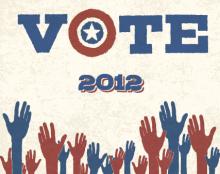
My early voting ballot is almost complete. I have done my reading, finished my research, and ignored a sufficient amount of robo-calls and attack ads. I have made my choices for county school superintendent, state representatives, and even U.S. Senator. But there is a gaping hole at the top of my ballot ...
It is November 6, 2012, and after more than a year of carefully following the presidential campaigns I still do not know which candidate I am going to vote for. I am an independent voter but registered as a democrat. On my Facebook page I identify my political position as "a morally-conservative Democrat or a fiscally-irresponsible Republican."
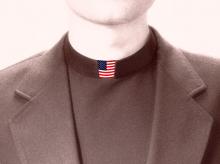
During the 2004 presidential election season, Sojourners put out a bumper sticker with these words: “God Is Not a Republican, or a Democrat.” The number of orders was overwhelming and we kept running out. The simple message struck a chord among many Christians who were tired of the assumptions and claims by the Religious Right that God was indeed a Republican, or at least voted a straight-party ticket for the GOP. They also absurdly implied — and sometimes explicitly stated — that faithful Christians couldn’t support Democratic candidates. We said that voting was always an imperfect choice in a fallen world, based on prudential judgments about how to best vote our values, that people of faith would always vote in different ways — and that was a good thing for a democracy and the common good.
Our efforts appeared to inject some common sense into our nation’s political discourse, but given recent electoral statements and newspaper ads from some conservative Christian leaders, it appears the message bears repeating — God is still not a Republican or Democrat.
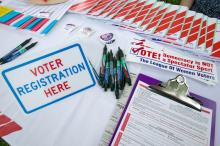
In four days our nation will decide its course for decades to come. On Nov. 6, ordinary people who have not already sent in their absentee ballots or stood in line to vote early, will walk, drive, caravan, and bus their way to polling stations scattered across every state in the nation. These ordinary people will exercise their right as American citizens to vote. They will also exercise their God-given call, as human beings made in the image of God, to exercise dominion (agency) within our grand democracy. Or at least they will try.
The deep waters of injustice are rising high and threatening to spill over on Nov. 6. Voters will have to wade through muck and mire to cast faith-filled ballots this year. So, listen up, study up, and get your gear on in preparation for Nov. 6.

As the winds and the rain of Hurricane Sandy settle down, one bit of the aftermath is going to be another round of conversation about how climate change is affecting our world.
It’s not a conversation you have heard much of in the presidential campaign this year. Climate change is one of a quartet of issues that will have a huge impact on the future of this nation that have gotten short shrift by both President Barack Obama and Gov. Mitt Romney.
Poverty. Guns. . Drones. Climate change.
Bring up any of those issues and watch the candidates make a quick nod of concern and then scamper away from any specifics. Yet those issues will be with us long after Nov. 6, so it is incumbent on those of us in the faith community to be laying the groundwork now for how we will address them in the coming year.
That work has already begun, of course. The challenge is not to let the post-election exhaustion sweep away those concerns like they were potted palms on a pier in the midst of the hurricane.
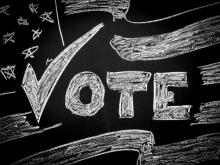
It seems so easy, doesn’t it? Love God. Love your neighbor. The two greatest commandments encapsulate the core of faith and could — if we really were to trust God — transform the world.
Similarly then and with election day looming, voting should be an easy affair: people of faith should vote for the candidates whose policies would most embody a love of God and neighbor.
It seems so easy, but it isn’t if we are honest with ourselves and gracious towards those who disagree with our political persuasions. No single party or candidate has a monopoly on loving God and neighbor. Moreover, people of passionate faith and commitment to the values Jesus commends in Mark 12:28-34 so often can’t even agree on what these seemingly simple commandments mean.
Such disagreements about what it means to love God and neighbor are at the very center of so many of our political debates.
Some Christians will vote for President Obama, arguing that the most loving thing we can do for our neighbor is to build a stronger social net. Some Christians will vote for Mr. Romney, arguing that the most loving thing we can do for our neighbor is let loose the power of the market to create good-paying jobs for all. Some Christians will cast a ballot for Mr. Romney in support of his stance on abortion. Some Christians will cast a ballot for President Obama, noting that the availability and affordability of basic health care is a pro-life position.
All of us, if we are honest, will vote for a flawed candidate.
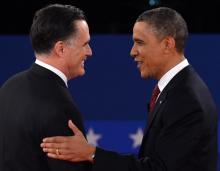
The presidential election is only weeks away… and it’s getting ugly out there. I mean … really ugly.
And before you think I’m just talking about the political process, the political parties, or the respective candidates, I was actually talking about you, me, us, and them … the people. And by people, I’m also especially talking about Christians.
Sometimes, I feel it would be appropriate to label how some Christians engage the presidential election season as “Christians Gone Wild."
Since there’s sure to be drama this week and next following the debates — and each day leading up to Election Day on Nov. 6, and likely some weeks afterward — I thought I’d share with you my 10 Commandments of the Election Season for Christians in hopes that it might speak some balance, sense, and perspective to any readers, not just during this election season but thereafter; not just in this country but in any country.
Why else am I sharing this?
Because I really want you to still respect yourself the morning after the election season.
Because I really want your friends to still respect you, too.
Know what I mean?
So, here are my 10 Commandments of the Election Season
Editor's Note: Theologian extraordinnaire Tripp Hudgins put together this edition of First Thoughts prior to the first presidential debate. Still applicable before this evening's Vice Presidential debate.
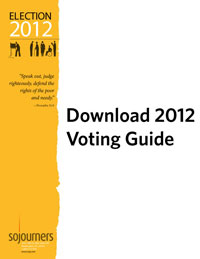 If you care about having a substantive conversation about issues that matter, you should share this post.
If you care about having a substantive conversation about issues that matter, you should share this post.
At its best, Christian faith provides a moral compass for advancing the common good. At worst, Christianity can be hijacked by partisan political agendas that divide and destroy. Sojourners encourages you to develop a robust and well-informed conscience around elections, measuring candidates and their platforms against Christian ethics and values. While we must be careful about translating scripture directly into public policy positions, there are principles and suggested approaches on a range of issues that can provide a critical framework to shape our perspective on public policy.
As we have since 2004, Sojourners has published an issues guide of principles and policies for Christian voters. We encourage you to use this guide to educate yourself on these issues. This can inform you as you write letters to candidates or to your local newspaper, call radio talk shows, and ask candidates at forums or town hall meetings questions based on these principles. Think and pray about whom, you would entrust with the responsibility to lead your community, state, and nation.
Share this with others and get ready for the conversation to begin.
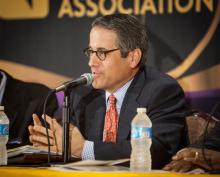
BETHESDA, Md. — With voters focused intently on pocketbook issues, both Mitt Romney and President Barack Obama are framing their faith-outreach efforts around the economy as the presidential campaign enters its final weeks.
That marks a shift from previous election cycles, campaign advisers say.
“That’s a major difference between this election and the last. The economy is the single issue that transcends every demographic, every coalition, every interest group,” said Mark DeMoss, an evangelical who has led Romney’s efforts to rally conservative Christians — a key Republican voting bloc — around the GOP nominee, who is a Mormon.
“Evangelicals are no less interested in the unemployment rate and the cost of living than non-evangelicals,” DeMoss added.
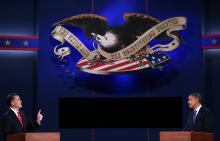
Last night millions of Americans watched the first Presidential debate of the 2012 election season. During the 90-minute debate, there were significant policy discussions about a range of issues, deep disagreements between the two candidates, and even a threat to Big Bird’s job security.
Yet despite all the arguing there was much left unsaid by President Barack Obama and Gov. Mitt Romney.

Editor's Note: Tweet @newshour to ask the candidates to #TalkPoverty in Wednesday's debate.
Marianne Williamson, a bestselling author and convener of the upcoming Sister Giant conference on women and politics, has called on President Obama and former Governor Mitt Romney to address “a meaningful array of topics” – including poverty, money in politics and incarceration rates in the U.S. – tonight during the first presidential debate.
Williamson talked to us earlier today about these issues, which are particularly pressing for Christians who take Matthew 25 seriously.
The interview was edited for length and content.
Q: What are you doing to get these issues out there?
A: Having a voice and creating your own platform is not all that difficult with today’s technology. I think what’s happening now is that, firstly, people are realizing that. Secondly, people are realizing that there are certain things that need to be said that simply are not being said as loudly as other things being said. When it comes to a politics of conscience, why wouldn’t we expect that during the debates there would be a conversation about the 23.1 percent of America’s children living in poverty, or the 34 percent of poor children, or the 46 million Americans living in poverty?

I was groomed in a Latino home where nail salons were viewed as rites of passage for becoming a senorita — growing young lady. Sometimes when I’m looking for some TLC, I head to my local nail salon in East Harlem. I could go to a more upscale salon, but here at Pretty Nail Salon, is where I want to be — connected to a neighborhood of ladies who have utilized storefront nail salons, beauty parlors, and hair-braiding places as makeshift therapeutic spaces where counsel and support is just as paramount to looking beautiful.
I have also discovered that nail salons are burgeoning places of policy concerns. Pretty Nail Salon has provided me with an informal education on how social policy affects the everyday day lives of working class folks. Our presidential candidates could also benefit from an appointment at Pretty Nail Salon, to listen to the local narratives and deepen their understanding of how social policy is affecting the lives of the urban poor and working class.
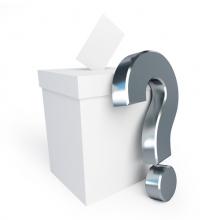
The white working class, a potentially rich bloc of voters for Republicans or Democrats, hasn’t settled on Mitt Romney or President Barack Obama, a new study from the Public Religion Research Institute shows.
“These white working class voters are not particularly enamored of either candidate,” said Daniel Cox, PRRI’s research director. “In terms of their favorability, they’re both under 50 percent.” Forty-four percent look favorably upon Obama and 45 percent upon Romney.
Released seven weeks before the election, the August survey found Romney with a double-digit lead over Obama among the white working class, which preferred the GOP candidate 48 to 35 percent.
But Cox points out that the gap narrows to statistical insignificance among women voters in this group, and in the Midwest and West, home of several swing states. The upshot for Romney and Obama?
If they want to woo this group, which makes up 36 percent of the nation according to the study, the campaigns may want to consider other findings of the PRRI poll.
As the faith leaders said yesterday, we have no choice but to respond when we learn that so many of our brothers and sisters are living in poverty. It makes these presidential candidate videos ones that every Christian should watch before they vote.
We asked the candidates, what will you do to address the highest numbers of people in poverty in America in almost 50 years—numbers that we learned today are still growing? We believe these messages from the Presidential candidates should lift the issues of poverty into the national debate into this election season.
We invite members of the press to watch these videos and to question these candidates even further about their visions and policy choices for overcoming poverty. The poverty numbers that came out yesterday require responsible journalists to make the question of poverty an important part of this election year discussion.
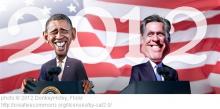
"In a democracy, the people get the government they deserve." – Alexis de Tocqueville
With the Democratic and Republican national conventions behind us, and an increase of political campaigning in front of us, we recognize the timeliness of the above quotation from Alexis de Tocquville. In a democracy the citizens choose their government, thus we indeed receive the government we deserve. As Lisa Sharon Harper recently stated:
"In its purest form, politics is simply how we organize our life together in society…in a Democratic Republic like our own, the [people are] ultimately responsible for the policies, laws, and structures that guide daily life. As we vote for candidates and ballot measures, we shape our society."
With such thoughts in mind, we affirm the collective ability to “shape our society," but we do so not only through the ability to choose our candidates and pass ballot measures, but we also possess the capacity to shape the process of how our leaders and policies are selected. In other words, while many complain about the high quantity and low quality of political campaigns, we are confronted with a harsh reality: In a democracy, we get the political campaigns we deserve.
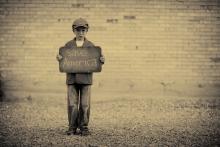
I’ll be honest … I’m a coward. During the political season I find myself avoiding certain conversations that I do care about. Mind you, I do have opinions. My wife would say I have an opinion on everything. Faith and social issues are extremely important to me, and I have spent a lot of years studying and following the trends and their impact on people I care a lot about. I am especially focused on issues that affect the poor, mentally ill, unemployed, addicted, and homeless. Topics of Medicare, unemployment benefits, the death penalty, gun control, abortion, gay marriage, state and federal budget and deficits, immigration, and foreign policy all matter to me. I do have opinions! (And I vote!)
Yet during the final months of America’s presidential street fight, I tend to lay low. I know that one simple conversation with almost anyone can turn volatile and unleash the beast within them. If educated congressmen, presidential candidates, governors, and even local representatives can be as nasty and polarized as they have publicly shown, there is little reason to honestly discuss an issue, since the potential for alienation and misrepresentation is at an all-time high. No one seems to be listening, having crystallized their presuppositions with a crafty skill of spinning any topic into their agenda. Ironically, our children are watching adult leaders model behavior we wouldn’t let them get away with.
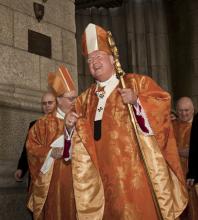
NEW YORK — Cardinal Timothy Dolan, who sparked controversy by agreeing to deliver the closing blessing at the Republican convention in Tampa this week, on Monday drew further attention to his political role by asking both Mitt Romney and Barack Obama to sign a “civility pledge” promoted by a leading conservative Catholic activist.
The archbishop of New York wrote to Romney and Obama, as well as their running mates, Paul Ryan and Joe Biden, asking them to sign the “Civility in America” pledge developed by Carl Anderson, head of the powerful Knights of Columbus and a man with long-standing ties to the Republican Party.
Republican presidential candidate Mitt Romney accused Democratic President Barack Obama of launching a “war on religion” in a television ad released on Aug. 9.
“President Obama used his health care plan to declare war on religion, forcing religious institutions to go against their faith,” the ad’s announcer states.
The ad pans to a shot of Romney on his recent visit to Poland saying, "In 1979, a son of Poland, Pope John Paul II, spoke words that would bring down an empire. Be not afraid."
It concludes, “When religious freedom is threatened, who do you want to stand with?”

Michael Goldstein voted for Barack Obama in 2008 and supports gay marriage and an assault weapons ban. Before moving to New Jersey 11 years ago to raise a family, the Brooklyn native fit right in with other lifelong Democrats in Manhattan’s Upper West Side.
But Goldstein now says he has buyer’s remorse. And last week the 48-year-old East Brunswick man became the face and voice of a national campaign aimed at converting fellow Jews who voted for Obama four years ago into supporters of Republican Mitt Romney.
In a video on the Republican Jewish Coalition website, Goldstein talks about his disappointment in Obama’s handling of the economy and U.S. relations with Israel.
“I was a big Obama supporter. I really believed in him and believed in what he stood for,” Goldstein says in the video. But, he continues, “when he gave the speech about the ’67 borders, it was nothing that had come up in his campaign originally. That really changed my mind about him.”
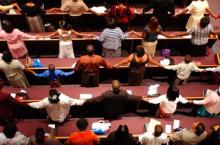
The pulpits of the nation's black churches took measure Sunday (May 13) of President Obama's decision to support gay marriage, and the result was conflicted.
Some churches were silent on the issue. At others, pastors spoke against the president's decision Wednesday — but kindly of the man himself. A few blasted the president and his decision. A minority spoke in favor of the decision and expressed understanding of the president's change of heart.
Bishop Timothy Clarke, head of the First Church of God, a large African-American church with a television ministry in Columbus, Ohio, was perhaps most typical. He felt compelled to address the president's comments at a Wednesday evening service and again Sunday morning. He was responding to an outpouring of calls, emails and text messages from members of his congregation after the president's remarks.